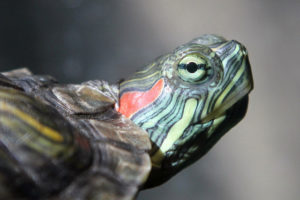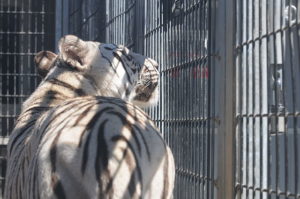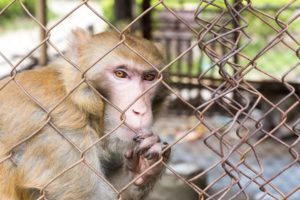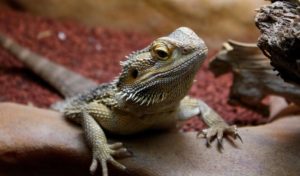Should People Be Aloud To Keep Exodic Animals
The Dangers of Keeping Exotic Pets
Exotic animals — lions, tigers, wolves, bears, reptiles, non-human primates — belong in their natural habitats and non in the hands of private individuals as "pets." Past their very nature, these animals are wild and potentially dangerous and, as such, do not adjust well to a captive environment.
Because the majority of states practise not keep accurate records of exotic animals entering their state, it is incommunicable to determine exactly how many exotic animals are privately held as pets, but the number is estimated to be quite high. An estimated five,000 tigers lonely are held by private individuals.
The American Veterinary Medical Association, the United States Department of Agriculture (USDA), and the Centers for Disease Control and Prevention (CDC) take all expressed opposition to the possession of sure exotic animals by individuals.
Exotic animals do non make good companions. They require special care, housing, diet, and maintenance that the average person cannot provide. When in the hands of private individuals, the animals suffer due to poor care. They besides pose safety and health risks to their owners and whatever person coming into contact with them.
Individuals possessing exotic animals oft attempt to change the nature of the animate being rather than the nature of the care provided. Such tactics include confinement in small, barren enclosures, chaining, beating "into submission," or even painful mutilations, such as declawing and tooth removal.
If and when the individual realizes he/she can no longer treat an exotic pet, he/she usually turns to zoos and other institutions such every bit sanctuaries to save him/her of the responsibility. However, all the zoos and accredited institutions could not perchance accommodate the number of unwanted exotic animals. Consequently, the majority of these animals are euthanized, abased, or doomed to live in deplorable conditions.
The Exotic Creature Pet Merchandise

Every twelvemonth, a variety of sources provides millions of animals to the exotic pet trade. Animals are captured from their native habitats and transported to diverse countries to be sold as pets. Others are surplus animals from zoos or their offspring. Backyard breeders also supply exotic animals.
It is absurdly easy to obtain an exotic pet. More than one,000 Internet sites offering to sell, give care advice, and provide chat rooms where buyers and sellers can haggle over a toll. Helping to facilitate the exotic pet trade is the Animal Finders' Guide, which carries ads from dealers, private parties, breeders, ranchers, and zoos offering large cats, monkeys, and other exotic animals for sale.
The sellers of these animals, however, brand no mention of the state or local laws regulating private possession of exotics, or of the dangers, difficulties, concrete and physiological needs of the animals they peddle. The suffering of the animals in the hands of unqualified and hapless buyers appears to be of no business organisation in the lucrative exotic pet trade.
Public Safety Risk

Exotic animals are inherently dangerous to the individuals who possess them, to their neighbors, and to the community at big. Across the country, many incidents have been reported where exotic animals held in private hands attacked humans and other animals, and escaped from their enclosures and freely roamed the community. Children and adults accept been mauled by tigers, bitten by monkeys, and asphyxiated by snakes.
By their very nature, exotic animals are dangerous. Although well-nigh exotic animals are territorial and crave group interactions, an exotic pet typically is isolated and spends the majority of his/her 24-hour interval in a small enclosure unable to roam and express natural behaviors freely. These animals are fourth dimension bombs waiting to explode.
Monkeys are the most common non-human primates held by individual individuals. At the historic period of two, monkeys begin to showroom unpredictable behavior. Males tend to become aggressive, and both males and females bite to defend themselves and to establish authority. Reported have been many monkey bites that resulted in serious injury to the individual who possessed the animal, to a neighbor, or to a stranger on the street. Co-ordinate to the CDC, 52 people reported being bitten past macaque monkeys between 1990 to 1997. CDC reported, however, that "owners of pet macaques are often reluctant to report bite injuries from their pets, even to their medical care providers" for fear that their animate being will be confiscated and possibly killed.

Not-domesticated felines, such every bit lions, tigers, leopards, and cougars, are ordinarily held as pets. These exotic animals are cute and cuddly when they are young but take the potential to kill or seriously hurt people and other animals every bit they abound. Even a seemingly friendly and loving fauna can assault unsuspecting individuals. Many large cats take escaped from their cages and terrorized communities. Several of these incidents have resulted in either serious injury to the persons who came in contact with the animal, or the death of the animal, or both.
Reptiles, including all types of snakes and lizards, pose prophylactic risks to humans as well. Many incidents take been reported of escapes, strangulations, and bites from pet reptiles across the country. Snakes are the well-nigh common "pet" reptiles — about three% of U.South. households possess vii.3 million pet reptiles — and have the potential to inflict serious injury through a bite or constriction. Co-ordinate to the Academy of Florida, more than than seven,000 venomous snake bites are reported annually in the United States (it is uncertain how many of these snakes are pets), xv of which event in death. Moreover, there have been several reported incidences involving strangulation by snakes. For example, on August 28, 1999, in Centralia, IL, a 3-yr-former boy was strangled to death by the family unit's pet python. The parents were charged with kid endangerment and unlawful possession of a dangerous beast.
Human Wellness Risk
Exotic animals pose serious health risks to humans. Many exotic animals are carriers of zoonotic diseases, such equally Canker B, Monkey Pox, and Salmonellosis, all of which are communicable to humans.

Canker B-virus: fourscore to 90 percent of all macaque monkeys are infected with Canker B-virus or Simian B, a virus that is harmless to monkeys but frequently fatal in humans. Monkeys shed the virus intermittently in saliva or genital secretions, which generally occur when the monkey is ill, under stress, or during breeding season. At any given time, about two% of infected macaque monkeys are shedding the virus. A person who is bitten, scratched, or sneezed or spit on while shedding occurs runs the risk of contracting the disease. Monkeys rarely show any signs or symptoms of shedding, making it nearly impossible to know when one is at take a chance.
Reported cases of infection in humans are very rare; since the identification of the virus in 1932, at that place have only been 31 documented human infections by B virus, 21 of which were fatal. Co-ordinate to the CDC, the reason for "such an apparently low rate of transmission may include infrequent B virus shedding by macaques, cross-reactive immunity against B virus stimulated by canker simplex virus infection, and undetected asymptomatic infection." However, the frequency of Herpes B infection in humans has never been adequately studied and thus information technology is difficult to quantify how many people are really infected with the virus. Persons who possess or work with infected monkeys are presumed to exist in abiding peril of potentially contracting the virus.
Bites from not-man primates can cause severe lacerations. Wounds may become infected, with the potential to reach the bone and cause permanent deformity. The frequency of bites remains a mystery. Although it is widely best-selling that non-homo primate bites are some of the worst animal bites, picayune research regarding them exists.
Monkeys have likewise been known to transmit the Ebola virus, monkey pox, and other deadly illnesses.

Salmonellosis: Probably 90 percent of all reptiles conduct and shed salmonella in their feces. Iguanas, snakes, lizards, and turtles are common carriers of the bacterium. Reptiles that deport salmonella do not prove any symptoms, thus at that place is no simple style to tell which reptiles play host to the microbe and which practice not, because fifty-fifty those that have it exercise non constantly shed the bacterium.
Salmonellosis associated with exotic pets has been described as 1 of the nigh important public health diseases affecting more people and animals than any other single disease. The CDC estimates that 93,000 salmonella cases caused past exposure to reptiles are reported each year in the United States.
Salmonella infection is caused when individuals eat later on failing to wash their hands properly after handling a reptile or objects the reptile contaminated (this can be either indirect or directly contact with infected reptiles). Salmonella leaner exercise non brand the animal sick, but in people can cause serious cases of severe diarrhea (with or without blood), headache, malaise, nausea, fever, vomiting, abdominal cramps, and fifty-fifty death — particularly in young children, the elderly, and those with allowed-compromised systems. In addition, salmonella infection can consequence in sepsis and meningitis (peculiarly in children) likewise equally invade the intestinal mucosa and enter the bloodstream causing septicemia and decease.
In March 1999, the CDC contacted every state wellness section to determine whether state regulations existed for sale of reptiles and distribution of information about contracting salmonella from reptiles. Forty-eight states responded — three (CA, CT, MI) had regulations requiring pet stores to provide information well-nigh salmonella to persons purchasing a turtle. Two states (KS, Doc) require salmonella data to be provided to persons purchasing any reptile, and three states (AZ, MN, WY) prohibit reptiles in day care centers and long-term-intendance facilities.
During 1996-1998, 16 different country health departments reported to the CDC salmonella infections in persons who had directly or indirect contact with pet reptiles, and in 1994-1995, 13 different state health departments reported salmonella infections. The CDC recommends that children, people with compromised allowed systems, and the elderly should avoid all contact with reptiles and non possess them as pets.
Laws Governing Individual Possession of Exotic Animals
The sale and possession of exotic animals is regulated by a patchwork of federal, state and local laws that generally vary past customs and by animal. Individuals possessing exotic animals must be in compliance with all federal laws as well as any state, city, and canton laws.
Federal Laws: Three federal laws regulate exotic animals — the Endangered Species Act, the Public Wellness Service Act, and the Lacey Act. Yet, these laws primarily regulate the importation of exotic animals into the United States and not private possession.
Nether the Endangered Species Deed (ESA) it is illegal to possess, sell, or buy an endangered species regardless to whether it's over the Internet or non. The ESA does not regulate private possession, information technology merely allows the U.S. Fish & Wildlife Service (USFWS) to prosecute individuals who illegally possess endangered species. It should be noted that "generic" tigers (subspecies that have been interbred) are non considered endangered and, equally such, can be legally bred and possessed.
The Public Health Services Act prohibits the importation of non-human primates and their offspring into the U.s. later October 1975 for any use other than scientific, educational, or exhibition purposes.
The Lacey Act allows the U.S. government to prosecute persons in possession of an brute illegally obtained in a foreign country or another state. Over again, this Human activity does not regulate private possession, information technology merely allows the USFWS to prosecute individuals who have illegally obtained exotic animals.
State Laws: The state governments possess the authority to regulate exotic animals privately held. Laws vary from land to state on the blazon of regulation imposed and the specific animals regulated. Some states ban private possession of exotic animals (i.e. they prohibit possession of at least large cats, wolves, bears, non-human primates, and dangerous reptiles); other states have a partial ban (i.due east. they prohibit possession of some exotic animals but not all); and others require a license or permit to possess exotic animals; and while other states neither prohibit nor require a license, they may crave some data from the owner (veterinary certificate, certification that animal was legally acquired, etc.).
Local Laws: Many cities and counties have adopted ordinances that are more stringent than the state law. Generally, the City or County Quango have determined that possession of certain exotic species poses a serious threat to the health, condom, and welfare of the residents of the community as a result of a recent assault in the surface area, an escape, or by the virtue of the animals' physical attributes and natural behavior and, as such, adopts an ordinance regulating or banning individual possession.
Some people often sidestep existing laws or bans by condign licensed breeders or exhibitors under the USDA and/or past having their property rezoned. In addition, individuals ofttimes move out of city limits or to a new state in one case a brake or ban is imposed.
What to Practise
You can do several things to help stop individual possession of exotic animals:
- For the animals' sake and for your health and safety, please do not buy exotic animals as "pets."
- If you discover an exotic animal being abused, living in deplorable weather, etc., report it to the appropriate brute control bureau.
- Educate others. Write a Letter to the Editor. Share this fact sheet with friends and family unit.
- Support legislation at all levels to prohibit private possession of exotic animals.
- Find out how your state, city and county regulates individual possession of exotic animals. If your country, city, or county does non prohibit private possession, contact your land senator and representative or your urban center and canton quango members and urge them to introduce legislation banning possession of exotic animals.
What Government Agencies and Public Officials Are Maxim
"The AVMA strongly opposes the keeping of wild carnivore species of animals [and reptiles and amphibians] as pets and believes that all commercial traffic of these animals for such purpose should be prohibited."
The American Veterinarian Medical Association
"Large wild and exotic cats such as lions, tigers, cougars, and leopards are unsafe animals … Considering of these animals' potential to kill or severely injure both people and other animals, an untrained person should non go along them as pets. Doing and so poses serious risks to family, friends, neighbors, and the general public. Even an animal that tin be friendly and loving tin can exist very dangerous."
The United States Department of Agronomics
"Pet reptiles should be kept out of households where children aged less than 5 years or immunocompromised persons live. Families expecting a new child should remove the pet reptile from the domicile before the baby arrives."
The Centers for Disease Control and Prevention
"Buying or giving exotic pets such as monkeys, hedgehogs, prairie dogs, reptiles, or other wildlife potentially can be dangerous to both humans and the animals themselves."
Veterinarian Jane Mahlow, Director of the Texas Department of Health Zoonosis Control Division
"People buy these [large cats] when they're kittens and don't have the foresight to see in 4 years that kitten is going to be 500 pounds, and instead of two bottles it is going to demand xxx to 50 pounds of meat a day. They try to brand a pet out of something that volition never be a pet."
Terry Mattive of T & D Mount Range Menagerie, a sanctuary for unwanted, abused and exploited jungle cats in Penn Creek, PA
"Macaques [monkeys] are aggressive and are known to acquit diseases, including canker B, which tin be fatal to humans … My opinion is primates make very poor pets."
Dr. Michael Cranfield, veterinary at the Baltimore Zoo and an expert on primates
Source: https://www.bornfreeusa.org/campaigns/animals-in-captivity/the-dangers-of-keeping-exotic-pets/
Posted by: richieeverne.blogspot.com

0 Response to "Should People Be Aloud To Keep Exodic Animals"
Post a Comment